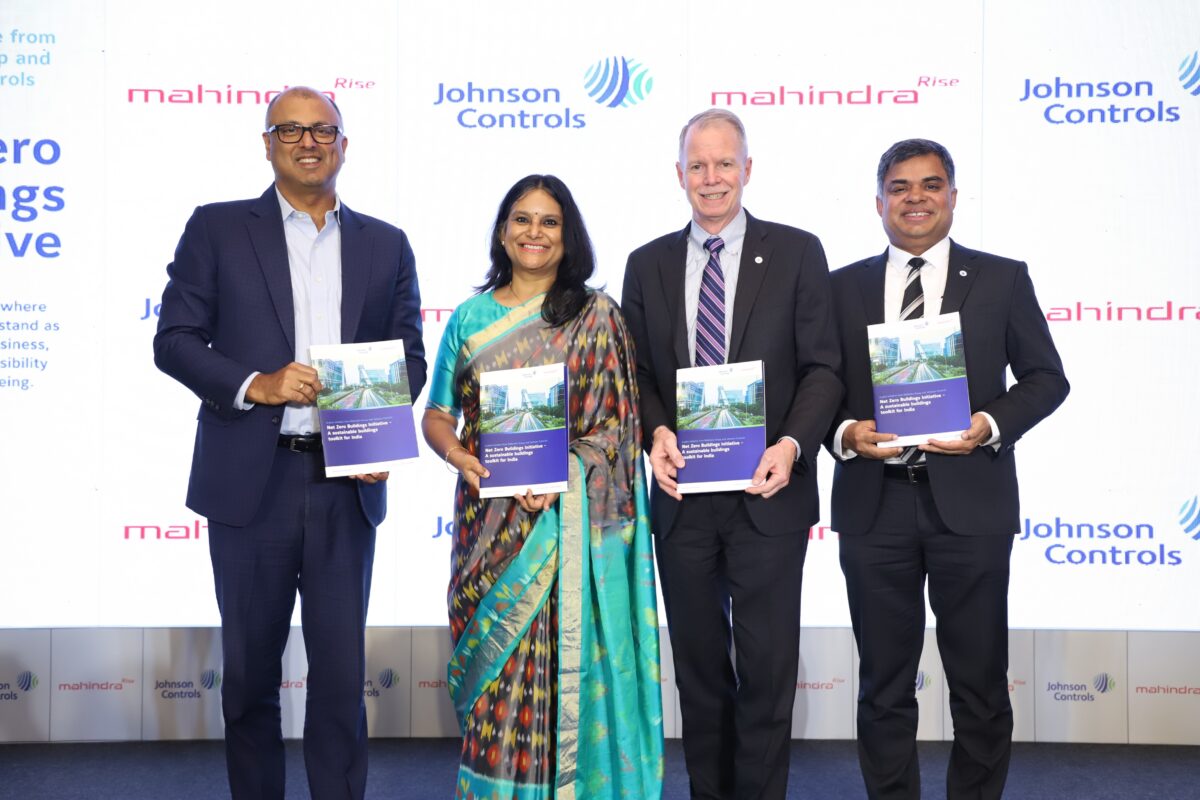Mahindra Group, one of India’s leading industrial enterprises, and Johnson Controls, the global leader in smart, healthy and sustainable buildings, today announced a Net Zero Buildings Initiative to decarbonize India’s commercial, urban residential, and public buildings. The joint initiative will simplify access to key information and resources to help organizations start their net-zero building journey.
“At Mahindra, we strongly believe in operating as a ‘Planet Positive’ organization. The group has undertaken multiple initiatives to decarbonize our operational infrastructure—leading to both financially and environmentally value accretive outcomes. We also understand the critical role of collaboration in accelerating a sustainable future, and hence join hands with Johnson Controls, leaders in net zero building solutions, to share our learnings and best practices with everyone,” said Abanti Sankaranarayanan, chief group public affairs officer and group executive board member.
According to the International Energy Agency, three-quarters of India’s anticipated 2040 buildings have yet to be built. With the sector accounting for 20% of emissions and more than 30% of energy consumption in the country, the transition to smart and sustainable buildings is becoming an environmental and economic imperative.
“With India on the cusp of a building revolution, now is the time to actualize the benefits of smart and green buildings for India’s economy and society,” said George Oliver, Chairman and CEO of Johnson Controls. “The joining together of our two companies to develop this unique initiative is a natural fit—leveraging Johnson Controls’ leadership in smart building technology and Mahindra’s renowned multi-industry expertise and reach. We believe it will help guide and inspire a movement toward a more sustainable built environment, both in India and beyond.”
As part of the Net Zero Buildings Initiative, the two partners launched a free-of-cost, sustainable buildings toolkit and training in India. This will help building and facility owners learn about best practices of sustainable buildings, implement tools to assess building parameters, identify and implement conservation measures, and understand building regulations in India, available incentives, technology, financing models, and more.
“This collaboration is a statement of intent from the construction industry to support the Indian government’s journey towards the low-carbon pathway of development…Built infrastructure is responsible for 40% of the global energy related emissions today, and most of the built environment in India’s cities, is yet to be constructed. It is absolutely imperative that we integrate sustainability and climate resilience into the life cycle of the built environment,” said Hardeep Singh Puri, union minister for housing & urban affairs & minister for petroleum and natural gas.
Investing in energy efficient infrastructure can potentially reduce electricity consumption by 40-60% compared to conventional buildings. According to India Energy Outlook 2021, even a 30% improvement in energy efficiency from buildings can potentially save 250 TWh of electricity by 2030, which means significant electrical energy could be given back to the grid to further fuel economic growth.
Across Mahindra Group, Mahindra Holidays has increased energy efficiency by more than 50% across resorts, Mahindra Auto & Farm sector has increased energy productivity by more than 90% across factories, and Mahindra Lifespaces launched Mahindra Eden, India’s first Net Zero Energy Residential building, that is expected to save over 1.8M kWh electricity annually. Similarly, Mahindra Logistics is investing to build energy efficient warehouses.
As part of the initiative, Mahindra and Johnson Controls will work closely with Indian national and state governments, think-tanks and industry associations, providing greater visibility on building data to aid in climate progress reporting and formulating strategies and frameworks.
This content is protected by copyright and may not be reused. If you want to cooperate with us and would like to reuse some of our content, please contact: editors@pv-magazine.com.









By submitting this form you agree to pv magazine using your data for the purposes of publishing your comment.
Your personal data will only be disclosed or otherwise transmitted to third parties for the purposes of spam filtering or if this is necessary for technical maintenance of the website. Any other transfer to third parties will not take place unless this is justified on the basis of applicable data protection regulations or if pv magazine is legally obliged to do so.
You may revoke this consent at any time with effect for the future, in which case your personal data will be deleted immediately. Otherwise, your data will be deleted if pv magazine has processed your request or the purpose of data storage is fulfilled.
Further information on data privacy can be found in our Data Protection Policy.